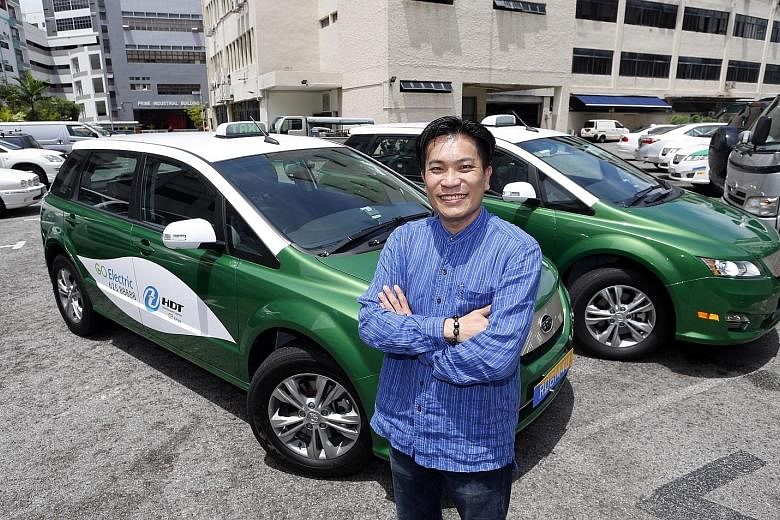They may be a month late, but the island's first all-electric taxi fleet can roll out early next month, after some glitches are ironed out, said new operator HDT Singapore Taxi.
Managing director James Ng said yesterday that technical issues with a driver management system were being addressed.
The system will be used to track the fare earnings and targets of taxi drivers, who are employed full-time - a unique practice in the industry. The other five taxi firms, which operate a combined 28,000 cabs, rent out their taxis to hirers.
Mr Ng told The Straits Times he expects the first 10 e-taxis - manufactured by Shenzhen-based battery and automaker BYD (Build Your Dreams) - to start plying the roads in a couple of weeks. The fleet will be progressively ramped up to 100 next year.
The flag-down fare will be $3.90, with a meter rate of 25 cents for every 400m for the first 10km, and every 350m thereafter, he said.
While this is pricier than the 22-cent meter rate charged by the bulk of the taxis here, he is optimistic commuters will take to the green rides. "For a 10km ride, it's about 75 cents more, but commuters will get to experience an electric car, which is more comfortable as they ride in total silence, compared to a car with a combustion engine," he said.
While HDT's e-taxi operation is part of a government electric-vehicle (EV) test bed, Mr Ng said he has to cover operating costs, including maintaining a call centre and mobile payment systems.
HDT also needs about 40 charging stations, each costing up to $20,000. It has 26 so far, he said.
As it is a trial, HDT's fleet size will be capped at 100, and its licence to operate taxis at eight years.
Despite the competition faced by the taxi industry from private-hire car services like Uber and Grab, Mr Ng is confident he can attract taxi drivers. He has hired 10 so far.
"I don't think it's a downside but an opportunity to attract taxi drivers by offering them a fixed salary and good training," he added. The basic salary is $1,600 a month but they can earn up to $3,200, if they hit a monthly revenue target. If they exceed this, they will co-share the revenue with HDT.
Some commuters said they may forgo the electric taxis as the 25-cent rate could add up. A 22km ride from Simei to Raffles Place, for example, would cost about $1.80 more. Mr Arvin Kanagalingam, 34, a customer service officer, said: "I would probably opt for cheaper taxis, unless I am in a rush."
Others were willing to give it a go. Mr Augustine Lim, 38, a communications executive, said: "It's not a big deal. I'll enjoy a quieter ride and be doing my part for the environment."


